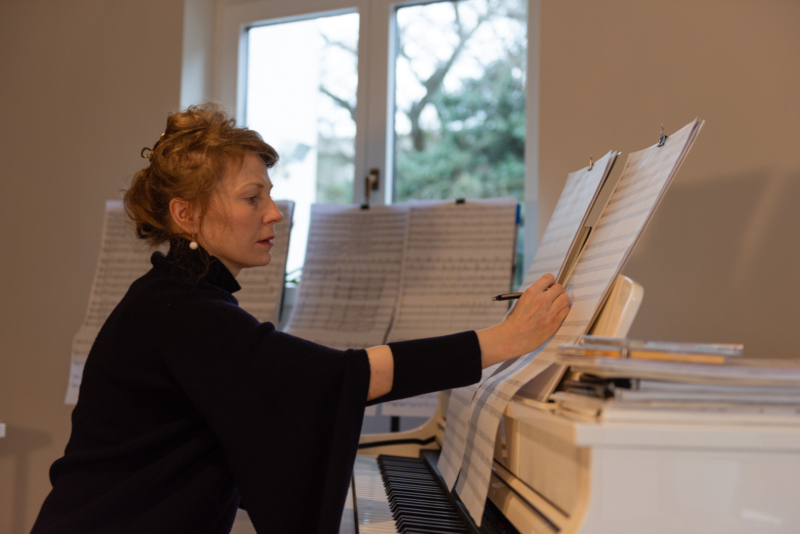Jagoda Szmytka
Composer

What do you find out with your music?
Inside this question I also read another one: “What kind of knowledge do you gain through your compositional practice?”. Subsequently I thought that I am asked “What music do you want to compose?” Based on my own experience, I would recommend to every composer to pose it to oneself at the beginning of every single composition. When I think of my past scores and programme notes, I could trace my main interests circulating around themes such as gesture, embodiment, modalities of musical material, and meaning of signs relating to the questions of musical notation.
Thus, most of my musical compositions can be seen as formal solutions to questions about the basics of a musical composition. Simultaneously they are emerging reflections of important issues in the today’s world, such as corporeality, liveness or search of identity.
Since 2021 I also persue the question “What do you want to compose?” in the Doctor Artium programme at the Artistic Research Center at the University of Music and Performing Arts in Vienna where I engage with specific aspects of composition as alternative or in parallel to artistic practice and theory.
What can disturb (your) music?
The biggest enemy of music, which disturbs it even before it is composed, performed or recorded, is a noisy workplace. When composing, I listen to my music with my inner hearing, turn on the metronome and write down everything I hear by means of musical notation with a pencil on paper. Sometimes I play musical instruments before I hear my music. Other times, I hear it internally first and then develop it further while playing musical instruments, piano, flute, violin and cello. In order to hear imaginary music precisely, I need peace and quiet around me. About a dozen years ago, I could compose anywhere. Even at the airport. For several years now, I can no longer imagine composing in a noisy place. I work best in my home studio. Here I have peace and quiet. I have a comfortable chair and two tables where I can work. Musical instruments are at my disposal. I have space to store my scores and drawings, as well as a library with collections of fiction, music and academic literature on music theory and visual arts, art history and philosophy. I have a colourful garden, complemented by a beautiful park near my house, ideal for short walks during breaks from composing. A noisy and chaotic environment would disturb me greatly. With regard to the composition itself, the most important skill is reducing the material to what is necessary for the piece. Unnecessary material can disrupt the composition.
Concert hall or outside?
The answer depends on the music of the program.
In the years 2007–2018 most of my compositions I wrote for amplified chamber ensembles. In these works, I used amplification in several functions. One of them was to redefine the dynamic proportions between sounds of different categories produced by musical instruments like in for travellers like angels or vampires (2012). In körperwelten (2008) my intention was to extend the dimension of acoustic body of musical instrument to the size of entire concert hall And in electrified memories of bloody cherries. Extended Landschaft von Musik” (2011) I wanted to intensify and saturate instrumental parts. Thus, all my instrumental compositions with obligatory amplification became more independent from the room they are performed as solely instrumental ones, because amplification allows the sound to flow in the performance space defined by positioning of instruments and loudspeakers, even if there are no walls that reflect the sound. Therefore, these compositions could be performed successfully both inside concert halls and in open spaces. From 2021 onwards, I have created solo-, chamber- and orchestral compositions that are exclusively acoustic compositions. Therefore I would consider a concert hall, preferably one with good acoustics, to be the most suitable space for their interpretation.
Issues related to performance spaces are also connected to the social dimension of music-making. As a composer, I realise that it is important to think about increasing the accessibility of music and attracting new audiences. One strategy for achieving this goal is to organise musical events in places such as easily accessible public spaces. In the years 2018–2020 I have been very dedicated to organising and curating interdisciplinary artistic events in frame of PLAY Plattform in open city spaces in Frankfurt and Offenbach am Main, which was a very precious experience for me as a composer, artist and artistic researcher.